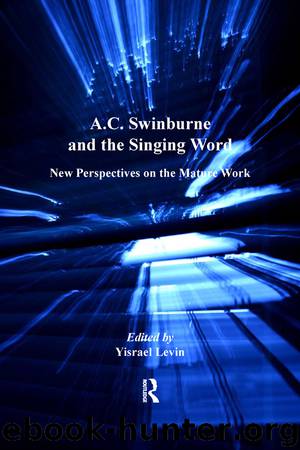A.C. Swinburne and the Singing Word by Yisrael Levin

Author:Yisrael Levin
Language: eng
Format: epub
Publisher: Ashgate Publishing Limited
Published: 2010-04-14T16:00:00+00:00
Sound and Fury: Collins and Furnivall
One of Swinburne’s less appealing characteristics was the haughty contempt with which he treated those he judged unfit to wear the laurel crown of poet. This sense of the superiority of his calling is at the heart of his disagreements with Furnivall and Churton Collins during the 1880s. As far as he was concerned, Furnivall was an editor and a pedant undeserving of respect, Collins was, in the last analysis, a hack, and a literary society open to the public at large was a contradiction in terms. Although Swinburne had belonged to “Old Mortality” at Oxford and had drunk with Richard Burton’s “Cannibals,” these had been select gatherings of distinguished individuals. The New Shakspere, however, was too democratic in its membership and too autocratic in its leadership, since Furnivall dismissed members over the slightest differences of opinion. It thus represented the worst of both worlds in the political uncertainty between the Reform Acts of 1867 and 1884. Swinburne was not the only eminent Victorian to cross swords with the “tireless and rather tiresome” Furnivall (Neville-Sington 234). Nevertheless, the levels of abuse that the two exchanged were startling, even for the adversarial world of late-Victorian bookdom, and show neither in a positive light. Swinburne had an insatiable appetite for controversy, and as Gosse says, “a diabolical cleverness in tormenting Furnivall,” while Furnivall dubbed the poet “Pigsbrook” and sniped at him with “insolent post-cards” and letters to the press (Gosse 250).
Leaving aside their fundamental clash of personalities, it is obvious that Swinburne and Furnivall had quite different ideas about Shakespeare’s reputation, status, and national purpose: they could not even agree on the spelling of his name. Furnivall and his society wanted a Shakespearean canon informed by as many biographical details as they could unearth, and placed poetry in a Procrustean bed, stretching and lopping it to fit the needs of their preconceived theories. Very different from the Baconians, Furnivall nevertheless shared their assumption that the life and the work were intimately connected if not actually inseparable, and that a dearth of biographical material should not in any way impede the ability to make deductions about the author from his work. Swinburne was closer to later scholars in his lack of concern with biographical details and his more accommodating model of differing and overlapping phases of Shakespeare’s development. He read Shakespeare alongside other Elizabethan writers in order to recognise the cultural context from which he emerged and, in the case of Edward III, to differentiate between his work and theirs. The particular qualities of Shakespeare’s poetry were attributable partly to his literary talent, partly to his knowledge of theatrical practicalities, and partly to the rich soil of the 1580s and 1590s in which he was nourished. Though these ideas were startling in themselves for an audience accustomed to the notion of Shakespeare as the timeless bard, their extravagant expression seemed, for some at least, to arise as much from the heat-oppressed brain as it did from rationality.
Swinburne’s relationship
Download
This site does not store any files on its server. We only index and link to content provided by other sites. Please contact the content providers to delete copyright contents if any and email us, we'll remove relevant links or contents immediately.
The Art of Boudoir Photography: How to Create Stunning Photographs of Women by Christa Meola(18627)
Red Sparrow by Jason Matthews(5474)
Harry Potter 02 & The Chamber Of Secrets (Illustrated) by J.K. Rowling(3677)
In a Sunburned Country by Bill Bryson(3542)
Drawing Cutting Edge Anatomy by Christopher Hart(3529)
Figure Drawing for Artists by Steve Huston(3451)
Harry Potter and the Prisoner of Azkaban (Book 3) by J. K. Rowling(3360)
The Daily Stoic by Holiday Ryan & Hanselman Stephen(3323)
Japanese Design by Patricia J. Graham(3177)
The Roots of Romanticism (Second Edition) by Berlin Isaiah Hardy Henry Gray John(2918)
Make Comics Like the Pros by Greg Pak(2918)
Stacked Decks by The Rotenberg Collection(2883)
Harry Potter and the Deathly Hallows (7) by J.K. Rowling(2725)
Draw-A-Saurus by James Silvani(2719)
Tattoo Art by Doralba Picerno(2668)
On Photography by Susan Sontag(2639)
Churchill by Paul Johnson(2587)
The Daily Stoic by Ryan Holiday & Stephen Hanselman(2578)
Drawing and Painting Birds by Tim Wootton(2510)
